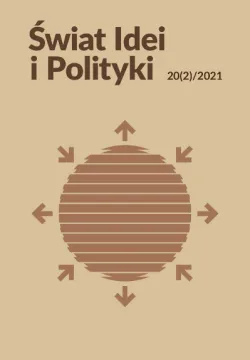Musical tastes vs. political preferences of young Poles – research report
DOI:
https://doi.org/10.34767/SIIP.2021.02.03Keywords:
music preferences, political orientations, authoritarian personality, cultural politics, political attitudesAbstract
In this article, the authors present a report of a quantitative empirical study devoted to the relationship between musical tastes and political preferences. The data collection process took place in 2019 on a sample of 831 students aged from 18 to 30. The respondents included in the measurements came from almost 50 academic centres across Poland. The research found a positive correlation between (1) preferred music genres and the level of acceptance of beliefs characteristic for an authoritarian personality; (2) preferred music genres and the manifested polit-ical orientation measured on the liberal-social vs. conservative-libertarian belief scale; (3) the level of acceptance of beliefs characteristic of an authoritarian person-ality and political preferences measured on the liberal-social vs. conservative-liber-tarian belief scale. Finally, it determined the probability at which the authoritarian personality and political preferences can be predicted based on the musical taste. The article also discusses the detailed extent of the determined relationships
References
Chrościcki, J. (1983). Sztuka i polityka. Funkcje propagandowe sztuki w epoce Wazów 1587–1668. Warszawa: Państwowe Wydawnictwo Naukowe.
Devenport, S.P., North, A.C. (2019). Predicting musical taste: Relationships with personality aspects and political orientation. Psychology of Music, 47, 6, 834–847. DOI: 10.1177/0305735619864647.
Fox, W.S., Williams, J.D. (1974). Political orientation and Music Preferences among College Students. Public Opinion Quarterly, 38, 3, 352–371. DOI: 10.1086/268171.
Gardikiotis, A., Baltzis, A.G. (2012). Rock music for myself and justice to the world! Music preferences, self-identities and social values. Psychology of Music, 40, 2, 143–163. DOI: 10.1177/0305735610386836.
Glasgow, R.M., Carter, A.M., Wilson, G.D. (1985). Conservatism, sensation seeking and music preferences. Personality and Individual Differences, 6, 3, 395–396. DOI: 10.1016/0191–8869(85)90065–0.
Hansen, C.H., Hansen, R.D. (1990). Rock music videos and antisocial behawior. Basic and Applied Social Psychology, 11, 4, 357–369. DOI: 10.1207/s15324834basp1104_1.
Jabłońska, B. (2018).O społecznym charakterze muzyki. Szkic socjologiczny. Pogranicze. Studia Społeczne, 34, 113–128. DOI: 10.15290/pss.2018.34.07.
Jakubowska, U. (1999). Preferencje polityczne. Psychologiczne teorie i badania. Warszawa: Instytut Psychologii PAN.
Jureńczyk, Ł., Szczutkowska, J., Trempała, W., Wenderlich, P. (2017). Problem uchodźstwa wojennego w dziełach wybranych twórców kultury i sztuki. W: Ł. Jureńczyk, J. Szczutkowska, W. Trempała, P. Wenderlich (red.), Wojna jako źródło inspiracji w kulturze i sztuce. Bydgoszcz: Uniwersytet Kazimierza Wielkiego.
Korzeniowski, K. (2002). Autorytaryzm i jego psychopolityczne konsekwencje. W: K. Skarżynska (red.), Podstawy psychologii politycznej. Poznań: Zysk i S-ka.
Lawendowski, R. (2011). Osobowościowe uwarunkowania preferencji muzycznych w zależności od wieku. Kraków: Oficyna Wydawnicza Impuls.
Leung, A., Kier, A.Ch. (2008). Music preferences and civic activism of young people. Jorunal of Youth Studies, 11, 4, 445–460. DOI: 10.1080/13676260802104790.
Mashkin, K.B., Volgy, T.J. (1975). Sociopolitical attitudes and musical preferences. Social Science Quarterly, 56, 3, 450–459.
North, A.C., Hargreaves, D.J. (2007). Lifestyle correlates of musical preference: 1. Relation-ships, living arrangements, beliefs, and crime. Psychology of Music, 35, 1, 58–87. DOI: 10.1177/0305735607068888.
Peterson, J.B., Christenson, P.G. (1987). Political orientation and music preference in the 1980s. Popular Music and Society, 11, 4, 1–17. DOI: 10.1080/03007768708591293.
Preacher, K.J., Hayes, A.F. (2004). SPSS and SAS procedures for estimating indirect effects in simple mediation models. Behavior Research Methods, 36(4), 717–731.
Rentfrow, P.J., Gosling, S.D. (2007). The content and validity of music-gen-re stereotypes among college students. Psychology of Music,35, 2, 306–326. DOI: 10.1177/0305735607070382.
Sajna, R. (2017). Wojna o niepodległość jako fundament kultury i sztuki Hispanoameryki. W: Ł. Jureńczyk, J. Szczutkowska, W. Trempała, P. Wenderlich (red.), Wojna jako źródło inspiracji w kulturze i sztuce. Bydgoszcz: Uniwersytet Kazimierza Wielkiego.
Sajna, R. (2019). Kompozytorzy muzyki poważnej jako migracji i uchodźstwa a problem promocji państw i narodów. W: Ł. Jureńczyk, J. Szczutkowska, W. Trempała, P. Wenderlich (red.), Zjawiska migracji i uchodźstwa w kulturze i sztuce w XX I XX wieku. Bydgoszcz: Uniwersytet Kazimierza Wielkiego.
Schoening, B.S., Kasper, E.T. (2011). Don’t Stop Thinking About the Music: The Politics of Songs and Musicians in Presidential Campaigns. Lanham, Maryland: Lexington Books.
Skarżyńska, K. (2005). Człowiek a polityka. Zarys psychologii politycznej. Warszawa: Scholar.
Trempała, W. (2019). Globalny kryzys środowiskowy jako źródło inspiracji dla wybranych twórców kultury i sztuki XXI wieku. W: Ł. Jureńczyk, J. Szczutkowska, W. Trempała, P. Wenderlich (red.), Zjawiska migracji i uchodźstwa w kulturze i sztuce w XX I XX wie-ku.Bydgoszcz: Uniwersytet Kazimierza Wielkiego.
Web-01: Makarenko, V. (15.08.2014 r.). Nasz gust muzyczny jest obliczony przez maszyny. Internetowe wydanie Gazety Wyborczej – Magazyn Wolna Sobota.
Web-02: Chyż, B., Makarenko, V. (17.03.2016 r.). Czy podziały polityczne przekładają się na podziały w kulturze? Czego słuchają wyborcy?. Internetowe wydanie Gazety Wyborczej.
Web-03: Deryło, A., Wieczorek, M., Makarenko, V. (6.05.2016 r.). Sprawdziliśmy, czy gusta muzyczne Polaków wiążą się z sympatiami politycznymi. Zobacz, co nam wyszło. Internetowe wydanie Gazety Wyborczej.
Downloads
Published
Issue
Section
License

This work is licensed under a Creative Commons Attribution-NonCommercial-NoDerivatives 4.0 International License.

